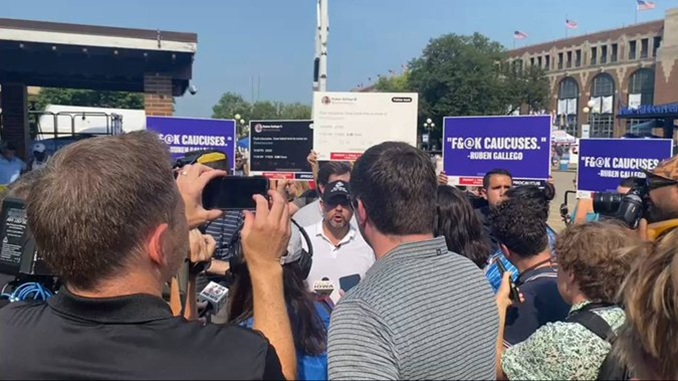
by Matthew Holloway | Aug 12, 2025 | News
By Matthew Holloway |
Legal documentation obtained by AZ Free News has revealed detailed allegations surrounding the pending termination of Voice of America (VOA) Director Michael Abramowitz and the assertions of U.S. Agency for Global Media (USAGM) Acting-CEO Kari Lake that efforts to block his termination are unconstitutional.
As previously reported by AZ Free News, Abramowitz received a notice of reassignment to become the Chief Management Officer of the VOA’s Edward R. Murrow Transmitting Station of the International Broadcasting Bureau in Greenville, NC. It was conveyed to him in a July 8th memo that “this geographic reassignment was needed to ensure adequate front-office supervision of USAGM’s primary domestic transmission facility for VOA content during this key transitional period.”
Per the response to Abramowitz’s legal motion, USAGM leaders informed Abramowitz at that time that his “presence in Greenville was needed to support an evaluation of the potential for an expanded USAGM staff presence at that facility.”
In a notification sent to Abramowitz, Senior Advisor to USAGM John Zadrozny wrote:
“The memorandum further directed you to complete and return the acknowledgment section to the Office of Human Resources at ExecutiveResources@usagm.gov no later than July 29, 2025.
“It also stated in no uncertain terms that, should you decline to accept the reassignment, you would be subject to removal under adverse action procedures pursuant to 5 U.S.C. § 7543. On July 29, 2025, you declined the reassignment.”
In a post to X on Monday, Lake explained, “The Former VOA Director was offered the opportunity to continue his employment at our transmitting station in North Carolina, a place that could benefit from his experience. Unfortunately, he declined his reassignment.”
The document further describes the justification for Abramowitz’s removal, stating, “The reassignment to Greenville was strategically aligned with agency priorities. Specifically, your presence at the Edward R. Murrow Transmitting Station was needed to ensure executive-level oversight and leadership during a critical period. This new role would have included directing and focusing staff at the facility on clearly defined operational and strategic priorities, while continuing to maintain and improve day-to-day operations there. It also involved providing regular feedback, direction, and training to ensure the facility staff remained engaged in fulfilling key agency objectives, including efforts to streamline agency functions in accordance with statutory requirements.”
Addressing Abramowitz’s argument that “Congress expressly provided that the ‘head[] of Voice of America . . . may only be . . . removed if such action has been approved by a majority vote of the [International Broadcasting] Advisory Board,’” the USAGM leadership counters that “the Chief Executive Officer, acting on the President’s behalf, may lawfully remove the Voice of America Director, an inferior officer.”
In the filing, USAGM argues, “The power to remove an inferior officer can be vested only in ‘the President alone, in the Courts of Law, or in the Heads of Departments,’” citing the U.S. Constitution as well as other legal precedents. “Here, that means the Voice of America Director—an inferior officer—must be removable at will by the President or the Agency’s Chief Executive Officer (the head of the Agency) acting on the President’s behalf.”
The agency also argues that, along constitutional grounds, due to the USAGM’s status as an executive branch agency, the U.S. District Court “lacks the power to enjoin Mr. Abramowitz’s removal as the Voice of America Director.” It notes that “under traditional principles of equity, courts of equity have no power over appointments and removals.”
In a brief statement to AZ Free News, Lake wrote, “We have numerous SES (Senior Executive Service) employees, all of whom are paid handsomely, and some of whom have been sitting home on paid administrative leave collecting a paycheck, but not working. That’s not fair to the taxpayer. We have positions where we need their skills, and we are attempting to get them into place where they can be helpful to our mission.”
Matthew Holloway is a senior reporter for AZ Free News. Follow him on X for his latest stories, or email tips to Matthew@azfreenews.com.

by Matthew Holloway | Aug 11, 2025 | News
By Matthew Holloway |
Video footage of Senator Ruben Gallego donning an apron and flipping burgers for the cameras in Iowa appears to show the publicity stunt backfiring on the Arizona Democrat as a chorus of merciless boos could be heard arising from the heckling crowd.
The video, shared by Turning Point Action Field Representative John J. Trotta IV, picked up traction on X with Trotta writing, “Ruben Gallego gets overwhelmingly booed while flipping patties at the Iowa State Fair. Iowans see right through radical Ruben and know he’s nothing but a fraud!”
Host of The Afternoon Addiction on 550 KFYI Garrett Lewis shared the post with the caption, “Iowans are brutal to @RubenGallego! It’s so good! So savage! You love to see it!”
Senior Advisor for the U.S. Agency for Global Media Kari Lake shared a much different memory of her 2024 trip back to her childhood home, writing, “I had a wonderful time at the Iowa State Fair last year. I even got to educate a New York Times reporter about the various genders. ‘The New York Times should try to milk a cow and then try and milk a bull and see how that goes.’”
Lake quipped in a comment, “Of course, @RubenGallego thinks cows have nuts, so he might be in for a rude awakening there too,” referring to an August 2023 video of Gallego lampooning Republicans as people whose “cultural identity” consists of owning guns and driving jacked up trucks with “cow nuts” hanging off their tailgates.
Notabl, as AZ Free News observed at the time, “Cows don’t have testicles, or ‘nuts’; only bulls do. Hence the centuries-old proverbial folly, ‘milking the bull.’ Furthermore, if Gallego knew anything about pickup trucks, the ‘nuts’ hang from the tow hitch, NOT the tailgate.“
A torrent of posts from Turning Point Action COO Tyler Bowyer followed, with Bowyer writing in one, “Ruben Gallego is upset because we ruined his trip to Iowa. Just wait until he goes to New Hampshire!”
He followed this up with the observation that “This guy was making Pfizer burgers in Iowa today? Or was that just for Tacos. We know who owns Ruben between Big Pharma and George Soros!”
After his Iowa debacle, Gallego is set to visit the West Valley next to deliver a Capitol update at the West Valley Regional Chamber on Wednesday, according to the West Valley View.
Matthew Holloway is a senior reporter for AZ Free News. Follow him on X for his latest stories, or email tips to Matthew@azfreenews.com.

by Matthew Holloway | Aug 10, 2025 | News
By Matthew Holloway |
Kari Lake’s work as Acting-Chief Executive Officer of the U.S. Agency for Global Media (USAGM) has progressed significantly in recent months after damning revelations in June on the state of the agency and its subsidiary operations including Voice of America (VOA). In her latest move to root out waste and international influence at VOA, Michael Abramowitz, the Biden-appointed now-former Director of VOA, was reportedly terminated Friday after he refused reassignment to a posting in Greenville, North Carolina.
According to a legal filing from Abramowitz, he was informed on July 8, 2025, that he was “removed from his ‘current position of Director, Voice of America’ and reassigned to a different one—as Chief Management Officer in Greenville, North Carolina,” and if he did not “accept” this reassignment he would face “adverse action procedures.”
Abramowitz reportedly responded in an email that the decision to “remove [him] from [his] position as Director of Voice of America[] . . . is illegal” because, “[u]nder the law,” the VOA director “can only be removed . . . with the approval of the International Broadcasting Advisory Board.”
As reported by the Washington Post, Abramowitz was subsequently terminated for “failure to accept directed geographic reassignment.”
Responding to the initial WaPo article on Abramowitz’s termination, Lake lampooned it as “biased,” and “anti-American propaganda,” in a post to X.
As previously reported by AZ Free News, Abramowitz has consistently worked in opposition to Lake and the Trump administration, actively speaking out against Lake’s program to “rightsize” the agency to within its statutory limits.
Responding to a raft of cost-saving measures Lake announced in early May, which included the termination of at least 584 employees and the end of J-1 visa employment, Abramowitz said he was “heartbroken” over the downsizing.
“I find this action inexplicable, and to my knowledge, no rationale has been provided by USAGM for this decision,” he wrote in a statement to the Post. “We will continue to make efforts to help individual PSCs, especially those who face possible return to hostile countries, in any and every way we can during this difficult time,” he continued, in a clear break from USAGM leadership under Lake.
In a letter he posted on Linkedin, Abramowitz informed VOA staff of his imminent ouster writing, “I wanted you to be aware that my lawyers have filed a motion in federal court today challenging efforts by USAGM to remove me as director of Voice of America. They believe USAGM’s action is plainly illegal. I can’t say much about the details of the case beyond what is laid out in the court filing. But I do want to stress that this action is not about me personally but about preserving the rule of law and fulfilling VOA’s vital mission of delivering fact-based news and information about America to the world.”
Correction: This story has been updated to reference Kari Lake’s new title as Acting-Chief Executive Officer of the U.S. Agency for Global Media.
Matthew Holloway is a senior reporter for AZ Free News. Follow him on X for his latest stories, or email tips to Matthew@azfreenews.com.

by Matthew Holloway | Aug 9, 2025 | News
By Matthew Holloway |
Democrat-Socialist endorsed politicians are not only present on Arizona ballots but appear to be thriving in the Tucson Democratic Primary. Miranda Schubert, running in the Aug. 5 primary for the Tucson Ward 6 council seat, and Sadie Shaw, running against incumbent City Councilmember Kevin Dahl in Ward 3, who also sits on the Tucson Unified School District governing board, were both endorsed by the Democratic Socialists of America’s Tucson chapter.
In a statement, the Tucson Democratic Socialists of America (DSA) celebrated the early results, saying, “Tonight, Tucson rejected the status quo and supported champions for Public Power and the working class. At a time when big corporations like Amazon are threatening Tucson’s water and a liveable climate, @mirandaforward6tucson’s decisive victory and @sadieforward3 running neck and neck with a well-funded incumbent proves that Tucsonans want elected leaders who will fight for policies like free-transit, affordable housing and public power that will address the crises we are facing and directly benefit the working class people of Tucson. We look forward to working with these two socialists and the most progressive city council in recent history to improve the lives of all people in Tucson.”
According to the DSA, “The Democratic Socialists of America is the largest socialist organization in the United States because we’re a member-driven mass organization.”
The unofficial election results showed that Schubert is trending to capture the Ward 6 council seat “by a wide margin.” As of Friday evening, the tally stood at 6,343 votes, against Democrats Leighton Rockafellow Jr., with 2,927 votes, and James Sinex won 365 votes. She is expected to face Republican Jay Tolkoff, who ran unopposed in his primary. Per AZCentral, Rockafellow has conceded the race.
Schubert declared victory and thanked her supporters Wednesday night, telling them, “I love local politics because it’s so simple. It comes down to having conversations, having conversations with your neighbors and with your fellow community members, and so I hope that this can be the start of more conversations and more work to come together to make Tucson a better place for future generations.”
The Ward 6 seat was vacated by former Councilman Steve Kozachik, who handily defeated Schubert by nearly 18 points in the 2021 Democratic Primary. Kozachik later stepped down to take over the Pima Animal Care Center in 2024. He was succeeded temporarily by Karin Uhlich, who later ran in her own right to finish out his term. However, in July, Uhlich announced she would not seek reelection, leaving Schubert as the frontrunner.
In the Ward 3 race, DSA-endorsee Sadie Shaw is trailing Democrat incumbent Councilman Kevin Dahl by just 19 votes as of this report. The councilman claimed victory, but Shaw has announced that she will await the final results once they have been canvassed and certified per Arizona law. The winner will face Republican Janet “JL” Wittenbraker, who ran unopposed in her primary.
Wittenbraker recently made waves in the city election by calling out the Tucson Sentinel for “failure to interview Republican candidates on key issues such as fare-free transit, Project Blue, and TPD funding,” adding this is “emblematic of their bias,” and “very disappointing.”
In a statement following the results, she told the outlet, “Tucson is ready for change, especially in Ward 3, where poverty, homelessness, and high crime rates resulted in a competitive race between Shaw and Dahl.”
Matthew Holloway is a senior reporter for AZ Free News. Follow him on X for his latest stories, or email tips to Matthew@azfreenews.com.

by Matthew Holloway | Aug 8, 2025 | Education, News
By Matthew Holloway |
In a post to X earlier this week, Chaya Raichik’s ‘Libs of TikTok’ revealed a now-deleted video allegedly created by an educator at the PPEP TEC High School’s Cesar Chavez Learning Center in San Luis, Arizona. The video urged teachers to “teach as hard as you can[.] So your students don’t grow up to be… Trump supporters.”
In a screenshot of the post, a man believed to be PPEP TEC High School teacher Edson Delgado, posting under the now-deleted profile ‘mrfacts5x’ wrote, in full, “This school year… Teach as hard as you can[.] So your students don’t grow up to be… Trump supporters. Make America Smart Again.”
In the caption of the post, he added, “If we don’t teach them critical thinking… someone else will teach them conspiracy theories. Let’s make America smart again.”
Libs of TikTok commented on the post, “Teacher at PPEP Cesar Chavez Learning Center in AZ wants to ‘teach’ students so they don’t grow up to be Trump supporters. Any comment @ppeptechs?? Do you condone teachers indoctrinating kids???”
The individual depicted in the post as ‘mrfacts5x’ bears a notable resemblance to Delgado, an educator who was honored by the office of Yuma County Superintendent Tom Hurt as doing “Great things at PPEP Tech!” In a March 25th post to Facebook and is identifiable through the certifications shown hanging behind him in the post to TikTok.
Several commenters on social media expressed reactions, ranging from concern to outrage. Political commentator Paul Szypula wrote, “Our schools are compromised.”
Columnist Emilia Henderson replied on X, “That teacher is PROGRAMMING kids with hatred for their own country. If PPEP allows this, they’re no school at all.. they’re a political FACTORY pushing Democrat obedience.”
Some critics of the TikTok post called for federal funding for PPEP TEC High School to be terminated, while others called for the teacher’s termination. At least one Arizona commenter, ‘JustADudeAZ,’ stated that he reported the incident to Arizona Superintendent of Public Instruction Tom Horne. He wrote, “Credit to Tom Horne for listening and getting back to me. He provided where to go to keep people like this teacher honest. If you see teaching like this you can report them directly using this site,” and provided a link to the Empower Hotline.
The hotline is “the forum to report about inappropriate lessons that detract from teaching academic standards such as those that focus on race or ethnicity, rather than individuals and merit, promoting gender ideology, social emotional learning, or inappropriate sexual content,” according to the Arizona Department of Education.
AZ Free News has reached out to PPEP TEC High School for comment but received no response by the filing of this article.
Matthew Holloway is a senior reporter for AZ Free News. Follow him on X for his latest stories, or email tips to Matthew@azfreenews.com.





